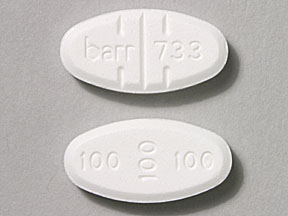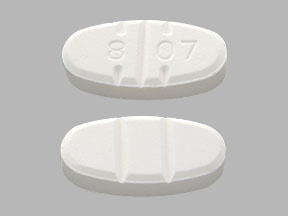Pill with imprint barr 733 100 100 100 is White, Oval and has been identified as Trazodone Hydrochloride 300 mg. It is supplied by Barr Laboratories, Inc.
Trazodone is used in the treatment of Depression; Sedation; Major Depressive Disorder and belongs to the drug class phenylpiperazine antidepressants. Risk cannot be ruled out during pregnancy. Trazodone 300 mg is not a controlled substance under the Controlled Substances Act (CSA).

How to Take Trazodone:
- Dosage: The dosage of trazodone varies based on the condition being treated, the patient’s age, and other factors. It is typically taken once or twice a day, often after a meal or a snack to reduce the risk of stomach upset.
- For Depression: The starting dose is usually around 150 mg per day, which may be gradually increased by the doctor. The dose may range from 150 to 400 mg daily, divided into smaller doses or as a single dose at bedtime.
- For Insomnia: A lower dose is usually prescribed, often around 25 to 100 mg before bedtime.
- Administration: Trazodone should be taken as prescribed by a healthcare provider. It is important to follow the dosing instructions carefully to avoid potential side effects or complications.
- Swallowing: Take the medication whole with a glass of water. Do not crush or chew the tablets, especially if they are extended-release.
- Missed Dose: If you miss a dose, take it as soon as you remember. If it is almost time for the next dose, skip the missed dose. Do not double up on doses to make up for a missed one.
Precautions:
- Alcohol: Avoid consuming alcohol while taking trazodone, as it can increase drowsiness and the risk of side effects.
- Interactions: Inform your doctor of any other medications or supplements you are taking, as trazodone can interact with other drugs, potentially leading to serious side effects.
- Side Effects: Common side effects include drowsiness, dizziness, dry mouth, blurred vision, and constipation. Severe side effects, such as changes in heart rhythm, should be reported to a healthcare provider immediately.
Trazodone Hydrochloride Off-label Usages
Trazodone Hydrochloride is primarily approved for the treatment of major depressive disorder, but it is also widely used off-label for several other conditions due to its pharmacological effects. Here are some of the common off-label uses:
1. Insomnia:
- Primary Off-Label Use: Trazodone is frequently prescribed for insomnia, especially when it is associated with depression or anxiety. Its sedative properties make it effective for helping patients fall asleep and stay asleep.
2. Anxiety Disorders:
- Trazodone can be used to manage generalized anxiety disorder (GAD), social anxiety disorder, and other anxiety-related conditions. It helps reduce anxiety symptoms by increasing serotonin levels in the brain.
3. Chronic Pain:
- It is sometimes used as an adjunct treatment for chronic pain conditions, particularly when these are associated with sleep disturbances or depression. Trazodone may help improve sleep quality and pain perception.
4. PTSD (Post-Traumatic Stress Disorder):
- Trazodone is used off-label to help manage symptoms of PTSD, particularly insomnia and nightmares. Its calming effects can be beneficial for patients with this condition.
5. Fibromyalgia:
- Patients with fibromyalgia, a condition characterized by widespread pain, may benefit from trazodone’s sleep-improving properties, which can indirectly reduce pain perception.
6. Migraine Prophylaxis:
- In some cases, trazodone is used off-label to help prevent migraines, particularly when they are associated with sleep disorders.
7. Alcohol Withdrawal:
- Trazodone may be prescribed to help manage symptoms of alcohol withdrawal, such as anxiety, agitation, and insomnia, although this use is less common.
8. Agitation in Dementia:
- In some cases, trazodone is used to manage agitation or behavioral disturbances in patients with dementia. However, this use requires careful monitoring due to the increased risk of falls and other side effects in elderly patients.
9. Panic Disorder:
- Trazodone may be used off-label to treat panic disorder, often in combination with other medications.
10. Eating Disorders:
- While not common, trazodone may be used as part of a treatment plan for eating disorders, particularly when these are associated with depression or anxiety.
Important Considerations:
- Efficacy and Safety: The effectiveness and safety of trazodone for these off-label uses can vary, and it is typically used when first-line treatments are ineffective or unsuitable.
- Consultation: Always consult with a healthcare provider before using trazodone for any off-label purpose, as the dosage and potential side effects may differ from its use in treating depression.
How Does Trazodone Hydrochloride Work ?
Trazodone Hydrochloride is an antidepressant that works by influencing neurotransmitters in the brain, particularly serotonin. Its mechanism of action is complex and involves several processes that contribute to its therapeutic effects.
Mechanism of Action:
- Serotonin Reuptake Inhibition:
- Trazodone primarily works as a serotonin reuptake inhibitor (SRI). It prevents the reabsorption (reuptake) of serotonin, a neurotransmitter, into neurons, making more serotonin available in the brain. Increased levels of serotonin can help improve mood, reduce anxiety, and alleviate symptoms of depression.
- Serotonin Receptor Antagonism:
- Trazodone also acts as a serotonin receptor antagonist, particularly at the 5-HT2A and 5-HT2C receptors. By blocking these receptors, trazodone helps modulate the activity of serotonin, reducing anxiety and depressive symptoms. This antagonism is also thought to contribute to its sedative effects.
- Histamine and Alpha-1 Adrenergic Receptor Blockade:
- Histamine H1 Receptor Antagonism: Trazodone has strong antihistaminic properties due to its ability to block histamine H1 receptors. This action contributes to its sedative effects, making it effective for treating insomnia.
- Alpha-1 Adrenergic Receptor Antagonism: Trazodone also blocks alpha-1 adrenergic receptors, which can cause vasodilation (widening of blood vessels) and may contribute to some of the drug’s side effects, such as orthostatic hypotension (a sudden drop in blood pressure when standing up).
- Impact on Sleep:
- Due to its combined actions on serotonin, histamine, and adrenergic receptors, trazodone has a notable sedative effect. This makes it effective for improving sleep quality in patients with depression, anxiety, or insomnia.
Summary of Effects:
- Antidepressant Effects: By increasing serotonin levels and modulating serotonin receptor activity, trazodone helps alleviate symptoms of depression.
- Anxiolytic Effects: The drug’s action on serotonin receptors also contributes to its ability to reduce anxiety.
- Sedative Effects: The antihistaminic and alpha-1 adrenergic receptor blockade lead to significant sedative properties, which are beneficial in treating insomnia but can also cause drowsiness as a side effect.
Apotex Corp.
Apotex Corp. is a Canadian pharmaceutical company and one of the largest producers of generic drugs in Canada. Founded in 1974 by Dr. Barry Sherman, Apotex has grown to become a major global player in the pharmaceutical industry, with a presence in over 115 countries. The company is headquartered in Toronto, Ontario.
Key aspects of Apotex Corp. include:
- Product Range: Apotex is primarily focused on the development, manufacturing, and distribution of generic pharmaceuticals, providing affordable versions of brand-name drugs. Its product portfolio spans a wide range of therapeutic areas, including cardiovascular, central nervous system, oncology, and anti-infective treatments.
- Research & Development: Apotex is known for its significant investment in R&D, with facilities dedicated to developing new generics, biosimilars, and innovative drug formulations. The company is involved in every stage of the drug development process, from research to regulatory approval.
- Global Manufacturing: Apotex has multiple state-of-the-art manufacturing facilities located in Canada, the United States, Mexico, and India. These facilities are designed to meet international regulatory standards, including those of the US FDA and Health Canada.
- Biosimilars: In addition to generics, Apotex has been expanding its portfolio to include biosimilars, which are biologic drugs that are similar to existing products but typically more affordable. The company is working on developing biosimilars in key therapeutic areas like oncology and autoimmune diseases.
- Global Reach: With a presence in over 115 countries, Apotex exports its products to major markets, including the US, Europe, Latin America, and Asia. It is one of the largest exporters of pharmaceuticals from Canada.
- Litigation and Controversies: Apotex has been involved in various legal disputes over the years, mainly related to patent litigation with brand-name pharmaceutical companies. These legal battles are common in the generic drug industry, as companies like Apotex seek to bring lower-cost alternatives to the market.
- Corporate Social Responsibility (CSR): Apotex is involved in various community initiatives and social responsibility programs. This includes donating medications to developing countries and supporting healthcare-related charitable activities.
Apotex has been a major player in making affordable medicines accessible to millions of people globally and continues to be a key figure in the generic pharmaceutical industry. Despite the passing of its founder, Barry Sherman, in 2017, the company remains an influential force in the global market.
